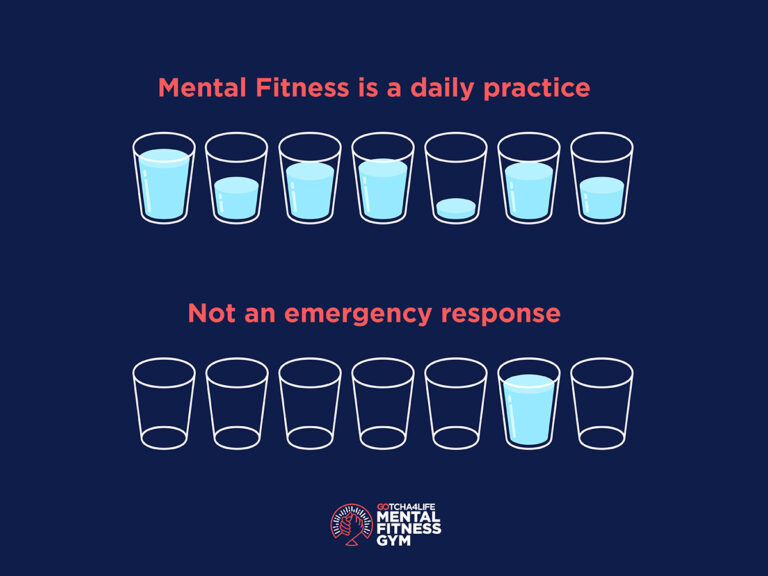
It’s time to consider our mental fitness like we do our physical fitness.
We don’t wait until we’re dehydrated to drink water, or until our teeth decay to start brushing regularly. We embrace these habits daily because they prevent bigger issues down the line. The same logic applies to mental fitness – it’s not just a lifeline when stress and challenges become overwhelming; it’s a daily practice that builds our emotional muscles and strengthens our ability to cope.
Proactively investing in your mental fitness means weaving simple actions into your everyday routine that support your emotional adaptability, sense of connection with others, and it also means getting practice at seeking help and support from others. This could be as simple as taking five minutes to reflect on your day (sounds simple, but it’s not always easy), making time to have meaningful conversation with a friend (even if it’s while you do a walk or fold the washing with your headphones on), or doing something that uplifts your spirit. It’s definitely not about perfection, or always getting it right; but it is about consistency. It’s giving it a go every single day, until it becomes a part of your daily routine. If you miss a day, that’s okay. What matters is picking up where you left off and continuing to practise it.

When we make mental fitness a non-negotiable part of our lives, we build a reservoir of strength. Just like staying hydrated prevents the negative effects of dehydration, consistent mental fitness practices help us face life’s ups and downs with more ease and confidence.
Let’s move away from seeing mental fitness as an emergency measure and treat it as the essential, daily habit it is. Small, consistent investments add up to significant improvements over time, creating a buffer that protects your mental health.

Another way to think about practising your mental fitness daily, is keeping your inner cup full. Or topping it up a little bit each day!
What’s one thing you can do today to top up your inner cup?
The Science of Mental Fitness
This study found that habits are often formed when behaviours are repeatedly tied to specific cues in our environment, leading to automatic actions over time. Consistency is key to turning deliberate actions into habits. Wood, W., & Neal, D. T. (2007). A new look at habits and the habit-goal interface. Psychological Review, 114(4), 843–863. https://doi.org/10.1037/0033-295X.114.4.843
This study on mindfulness and gratitude practices demonstrates that daily habits—even micro-practices like taking five deep breaths or listing three things you’re grateful for—lower cortisol levels and increase resilience to stress. Fredrickson, B. L. (2004). The broaden-and-build theory of positive emotions. Philosophical Transactions of the Royal Society B: Biological Sciences, 359(1449), 1367–1378. https://doi.org/10.1098/rstb.2004.1512


 back to Learn
back to Learn